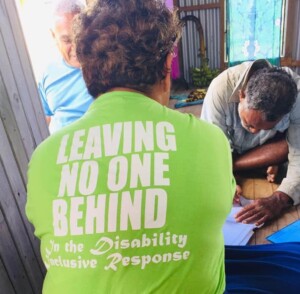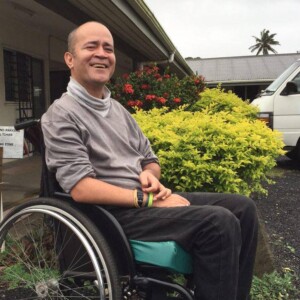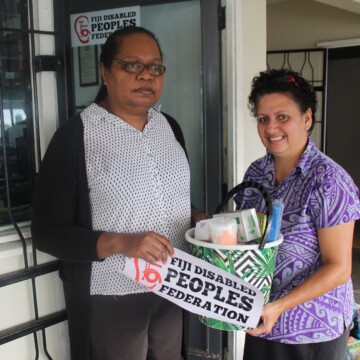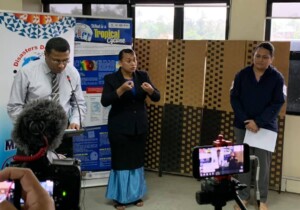Fiji’s disability sector learning to cope with the new normal
August 17, 2020
by Erica Lee

Photo credit: FDPF
There is no doubt that globally, nations have been significantly impacted socially, physically and economically by the outbreak of the novel coronavirus (COVID-19). While some nations have fared better than others and have eased restrictions, others are now seeing a second wave of infections and renewed restrictions. One thing is for sure though, the effect and experience of the pandemic has been varied and for some groups their marginalisation from resources has been exacerbated.
Research shows that in times of crisis, women, children and people living with disabilities are often further marginalised and are at further risk of injury, abuse, neglect.
In Fiji, the impact of COVID-19 and tropical cyclone Harold which both happened around March, brought unprecedented challenges to Fiji’s disabled citizens who represent 13.7%[1] of Fiji’s population.
Josko Wakaniyasi, President of the Fiji Disabled Peoples Federation (FDPF) says that March – June had been especially hard on the Federation and its affiliates: Fiji Association for the Deaf, United Blind Persons of Fiji, Spinal Injuries Association, and Fiji Psychiatric Survivors Association.
While the Fijian Government eased COVID-19 restrictions as of May, its impact had already taken its toll on FDPF’s members.
Challenges of the lockdown and preventative measures

Photo Credit: Motivation Australia
Being wheelchair-bound himself due to a spinal injury, Josko shared his own challenges with the concept of social distancing and the lockdown.
“While we understood the need for social distancing, for those living with a disability like myself, we rely heavily on the support of our carers to help us with day to day activities. COVID-19 and the lockdown presented us with new challenges and it forced us to find ways to practice heightened hygiene and to ensure that our carers were also taking the necessary precautions so as not to possibly carry the virus to our homes.”
For the Psychiatric Survivors Association (PSA), access to regular meals and medicine, discrimination, the loss of coping mechanisms (like taking long walks) and their ability to have face to face peer support meetings was some of the challenges their members faced.
PSA Executive Director Sera Osbourne says the Association’s communications costs also rose drastically during the lockdown because they spent a considerable amount of time on the phone constantly checking in on their members, ensuring that they were well informed about the COVID-19 restrictions and just following up on their general well-being.
“We had a few members who displayed heightened anxiety and for these members, we sought approval to visit them outside the curfew hours as we need to be able to respond quickly as these instances can mean life or death,” she said.
With there being no safe house or facilities especially for members who are homeless and living on the streets of Suva, PSA worked with the Ministry of Women, Children and Poverty Alleviation to assist 22 (17 being women) of its members to return home to their families. Unfortunately, many of them refused the assistance saying they would rather be on the streets than return home to many of the troubles that they had previously escaped. During the lockdown, the PSA members on the streets also reported having very little to eat because not many people were around the city to provide them with food, especially during lunch time. With budget constraints, PSA could only provide one hot meal a day for these members. PSA also ensured that they were also part of the COVID-19 screening.
COVID-19 Contingency Plans
After the announcement of the first COVID-19 case in March, the Disability sector led by the National Council for Disabled Persons (NCDP) Secretariat reacted quickly working with the Ministry of Health and Medical Services and the National Disaster Management Office to develop contingency plans and protocols if in the case that one FDPF’s members were to contract the virus. The NCPD Complex located at Brown Street in Suva was identified as the ideal quarantine facility and had been equipped with hospital beds and other medical equipment to treat disabled patients if the need arose. The Centre, which is already tailored to the needs of people with disabilities, has bathrooms, toilets, kitchens and classrooms that would provide the much-needed comfort and support for FDPF’s members.
Also, while it is normal practice for the Federation, especially its affiliate Spinal Injuries Association (SIA), to use hand sanitizers, disinfectants and gloves for their daily activities, the Federation said that they faced increased costs over those months as they had to order bigger quantities of personal protective equipment (PPEs) including face masks for its staff. This came at a time when the whole nation scrambled to buy PPEs and due to shortages, the prices of PPEs were extremely high. Classed by the government as essential services during the lockdown period, the PPEs allowed FDPF and its affiliates to continue to serve the community while also ensuring the safety of their members.
Speaking about the use of face masks and other PPEs, Josko said that while it was a requirement for all SIA staff to wear while providing home deliveries or repairs to mobility devices, the masks created new challenges and barriers for SIA’s staff and members.
“For those living with disabilities, we can be very self-conscious about our cleanliness and appearance to others especially strangers who visit our homes. Our staff reported feeling uncomfortable wearing the masks as it gives the wrong impression that working with our members was unpleasant. Our team then discussed ways to first explain COVID-19 restrictions and the need for us to wear protective gear so as not to offend those we help.”
Partnership and collaboration

Hygiene kits Photo Credit: FDPF
Josko says that the disability sector had increasingly received calls from members of the public seeking support.
“For families who had lost their employment, trying to take on extra responsibilities themselves can be quite daunting and the cost of their care and hygiene products like diapers is a significant expense. Where possible we have tried to help and have already distributed: 102 food rations, 11 farming kits containing tools and seedlings, 70 dignity & hygiene packs which included diapers and 60 mixed kits containing food rations, hygiene products and seedlings. These kits and rations were made possible through a partnership with the Fiji Women’s Crisis Centre, Medical Services Pacific, Australian Humanitarian Partnership, Private Companies, Church of the Latter-Day Saints (LDS Charities) and PhysioNet UK.
Josko says that the on-going support of these organisations and the collaboration of organisations for persons with disabilities (OPD) and NCPD has been immense.
“While we are providing immediate support to families who have been adversely affected, our long term goal is to focus on self-sustaining activities like farming and the provision of seedlings. We also hope to expand our support beyond the Central Division and we have begun scoping possible activities in the three other divisions.”
The Federation is also working with the United Nations Development Programme (UNDP) on awareness programmes especially on the radio and television to provide information to its members on COVID-19. FDPF has also teamed up with the Human Rights and Anti-discrimination Commission (HRDC) and UNDP for the inclusion of sign interpreters on two television channels in Fiji to assist deaf persons and the visually impaired access timely and accurate information and to make informed decisions. This outcome according to Josko has been the biggest win for disability in Fiji during COVID-19. He says that the Federation is hopeful that the television stations would see the continued benefit of having the sign-interpreters post-COVID-19.
Working with the Adventist Development and Relief Agency (ADRA) and the Australian Humanitarian Partnership, FDPF is partnering with a consortium of six humanitarian NGOs from Fiji and Australia under the Disaster READY Fiji program. FDPF’s participation in the consortium ensures that any programming during disasters includes the voice and experiences of persons with disabilities.

Funding constraints
The biggest challenge that FDPF has faced over the past four months has been funding constraints. National budget cuts in March significantly impacted the work of the Federation and its Affiliates thus reducing the majority of its operations. For one of the affiliate organisations (Spinal Injury Association), 90% of their services were reduced. This reduction was a concern given that SIA is the only organisation in Fiji that provides mobility devices like wheelchairs and given Fiji’s high rate of diabetes-related amputations, their services are crucial. FDPF and its affiliates all reported having to reduce the working hours of their 40 staff with some going without wages for almost two months.
Through Australian Government funding, a combined effort by the Australian Humanitarian Partnership, Pacific Women Shaping Pacific Development and the Fiji Women’s Fund contributed towards FDPF and its affiliates keeping its doors open and its staff employed especially during these difficult times when thousands of Fijians are without jobs. The support of these organisations will also ensure that FDPF can support its members through COVID-19 response and Tropical Cyclone Harold recovery.
“Without this commitment, the immediate short term future of these organisations and its vital service delivery program was at risk of closure. We are thankful that the Fiji Women’s Fund has been a supportive partner every step of the way during these last couple of months,” said Josko.
If you would like to support FDPF through kind donations or volunteering your time, please reach out to the Federation via email: lanietatuimabu@fdpf.org
[1] https://www.fiji.gov.fj/Media-Centre/News/Fiji-Bureau-of-Statistics-Releases-2017-Census-Res
Recent Whats New
WFF Visit to “Rise Beyond the Reef”
December 12 2023
LifeBread Confident Woman Program Graduation
December 12 2023
